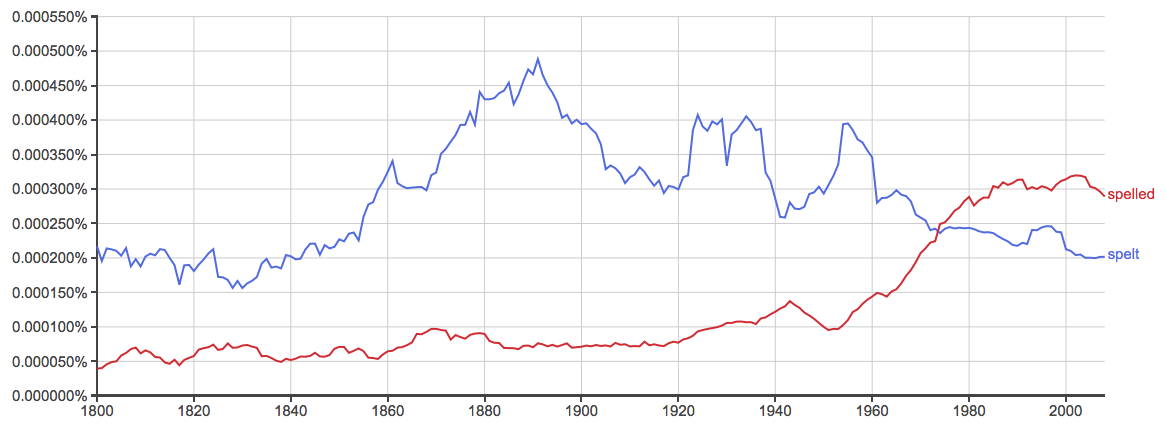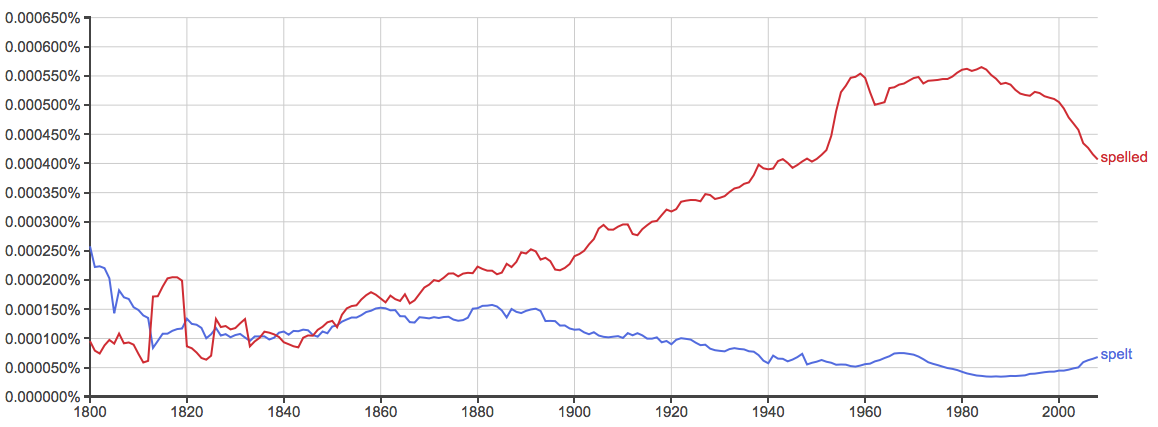The English language has a lot of irregular verbs. Irregular verbs are verbs that don’t take on the typical past tense spelling pattern.
Talk is an example of a regular verb. It changes from present to past by adding an “ed” to the end of the word.
- I talk.
- I talked.
Speak is an example of an irregular verb. It completely changes when it forms the past tense.
- I speak.
- I spoke.
Well, the verb to spell is actually an English verb that has both a regular and an irregular form.
- I spell. (Present)
- I spelt. (Past)
- I spelled. (Past)
Both of these forms are correct, but they’re not always interchangeable. Sound confusing? Don’t worry. I’ll explain everything you need to know about spelt vs. spelled below.
What is the Difference Between Spelt and Spelled?
In this post, I will outline the different uses of spelled vs. spelt and when it is correct to use each spelling.
Plus, at the end, I will give you a helpful trick for remembering their different uses.
When to Use Spelt
 When should I use spelt? Spelt has been, historically speaking, the preferred past tense spelling of to spell in British English.
When should I use spelt? Spelt has been, historically speaking, the preferred past tense spelling of to spell in British English.
- The investigation revealed that Bradbourn’s name was spelt incorrectly on paperwork. –The Guardian
Over the 19th and 20th centuries, spelt was much more commonly seen in British writing than spelled. It wasn’t necessarily considered a mistake to use spelled in Britain, spelt just happened to be the preferred, more common spelling.
This preference seems to be waning, however, as spelled has grown in popularity in Britain in recent years (see below).

This chart is not scientific or exhaustive by any means (it only covers English books), but it is helpful in identifying trends, and the trend is clear. Whether or not spelled is actually used more frequently in British English than the once more popular spelt, we can’t be sure.
But it is clear that the frequency of spelled is on the rise in Great Britain.
Spelt as a noun. Spelt can also be used as a noun. It refers to a type of wheat that was widely cultivated in southwest Asia, the Near East, and Europe during the Bronze Age. In modern day, it is grown chiefly in Europe.
- The spelt buns need little time to rise because spelt grain reacts so swiftly with yeast, so they can be made–unusually for bread–alongside the soup. –The Telegraph
Spelt or Spelled in British English
All of this is to say that both forms (spelt and spelled) are accepted in British English. Most British, Irish, and Australian writers don’t seem to make a distinction between them.
This trend is almost certainly a result of American influence spreading (see below).
When to Use Spelled
 When should I use spelled? Spelled is the preferred past tense spelling of to spell in American English.
When should I use spelled? Spelled is the preferred past tense spelling of to spell in American English.
- Icelanders’ pronunciation of place-names is confounding even when you have the words spelled out on paper. –The New Yorker
This preference in American English has been clear for quite some time.

As you can see, spelled has been the preferred spelling in American English for some time and the gap between the two is quite large.
In fact, spelt is generally considered a misspelling in American English.
If you are a student in America, or ever find yourself writing to an American audience, spelled is the correct choice.
Spelt out or Spelled out?
The most common use of to spell is, of course, to name or write in order the letters constituting a word.
- My name is spelled J-O-H-N.
And, as we learned, spelt is more common in British English, spelled is more common in American English.
What about other meanings or phrases using the word?
The phrase to spell out, to make clear or explicit, usually employs spelled.
- He spelled out the details of his plan.
You can find publications that use spelt out, but they are less frequent.
Similarly, phrases like spelled trouble, spelled disaster, spelled ruin, etc., all use spelled more frequently than spelt—in British and American English.
Trick to Remember the Difference
Still not sure when to use spelled or spelt? Here’s a helpful trick to help you remember.
Spelt is commonly used in British English. Spelt and British both have a letter “T” in them.
Summary
Should I use spelt or spelled? This depends on who your audience is.
Spelt has been the preferred choice in British English for many years, where spelled is also acceptable.
Spelled is the preferred choice in American English, where spelt is viewed as a misspelling.
Contents
